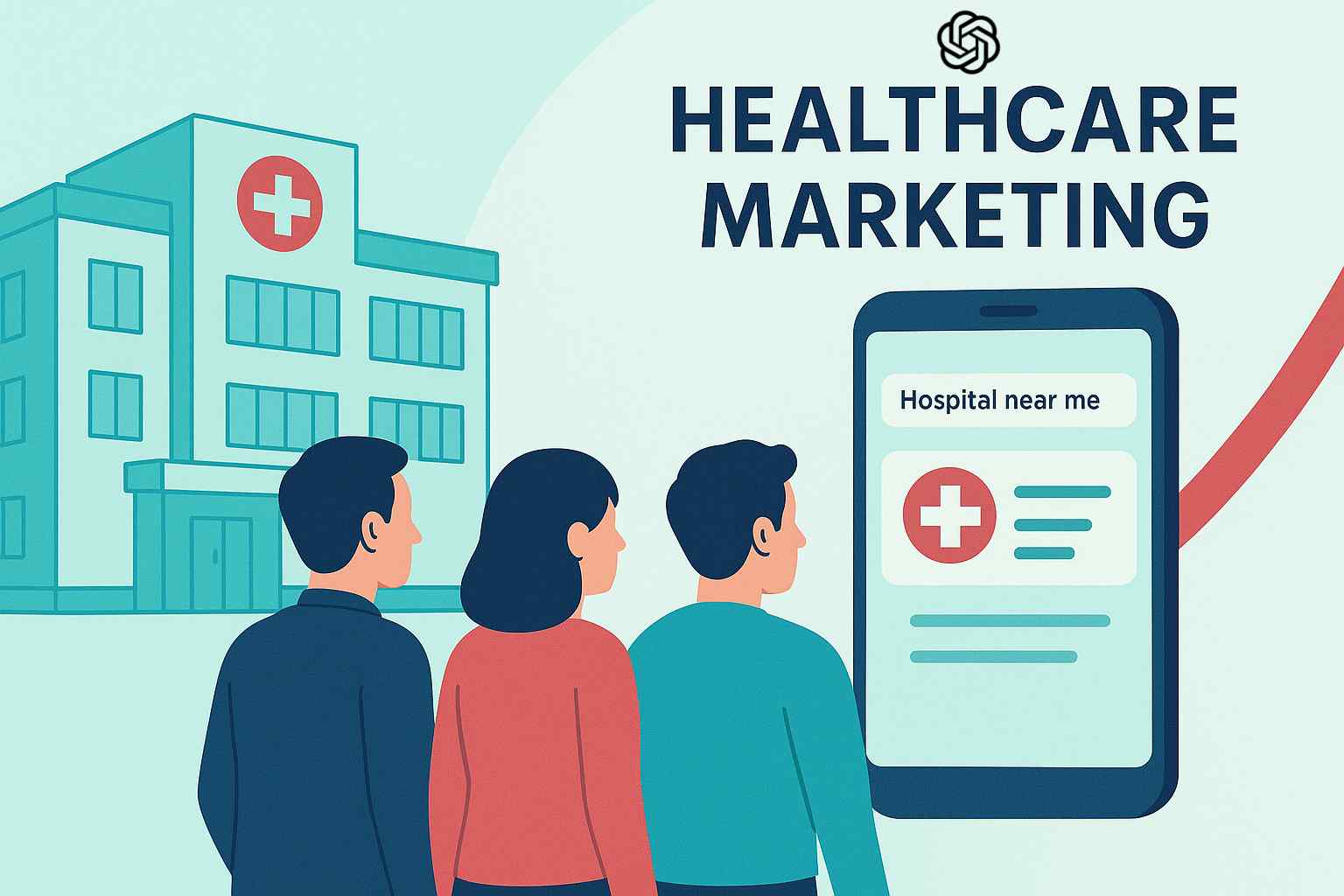
The Importance of SEO in the Healthcare Industry
The digital age has transformed industries’ operations, and the healthcare sector is no exception. Among the many digital strategies employed, Search Engine Optimization (SEO) is a crucial part of healthcare professionals and organizations. This blog delves into the significance of SEO in the healthcare industry, highlighting its benefits and the importance of understanding the audience’s needs.
A Brief Overview of SEO and How it is Used in Healthcare Sector
Search Engine Optimization is a strategy that involves optimizing a website to rank higher in search engine results. This process is essential for healthcare providers seeking to increase traffic to their online visibility and attract more patients.
Healthcare organizations and SEO marketing agencies collaborate to create informative and engaging content that answers potential patients’ queries. By doing so, they generate traffic to your website, making it easier for patients to find them online. This is where the expertise of SEO professionals becomes invaluable, as they employ strategies tailored to the healthcare industry’s unique needs.
Benefits of SEO for the Healthcare Industry
The advantages of implementing SEO strategies in the healthcare sector are manifold. First and foremost, SEO helps generate website traffic. With most people turning to search engines for health-related information, appearing at the top of search results can significantly increase traffic. This enhances the visibility of healthcare services and boosts the provider’s credibility.
Another significant benefit is the cost-effectiveness of SEO. Unlike traditional online advertising, which often requires substantial ad budgets, SEO focuses on organic growth. This makes it an attractive option for healthcare providers looking to generate traffic to their websites without the hefty price tag of paid advertising.
Understanding Your Audience and Their Needs
A deep understanding of your target audience lies at the heart of a successful SEO strategy. For healthcare providers, this means recognizing potential patients’ concerns, questions, and preferences. By identifying the keywords and phrases your audience uses in their search engine queries, you can tailor your content to meet their needs more effectively.
This audience-centric approach enhances the relevance of your content and improves the chances of conversion. When visitors find the information, they’re looking for on your site, checking for hospital reviews, they’re more likely to consider your services. Therefore, engaging with SEO professionals or SEO agencies who thoroughly understand both SEO and the healthcare industry can make a significant difference in your online marketing efforts.
In summary, SEO is an indispensable tool for the healthcare industry in the digital age. By improving online visibility, enhancing user experience, and offering a cost-effective way to generate website traffic, SEO can help healthcare providers connect with their audience more effectively. Understanding the needs and behaviors of potential patients is crucial for tailoring SEO strategies that attract and retain patients. With the expertise of SEO professionals and marketing agencies, healthcare organizations can navigate the complexities of search engine algorithms and emerge as leaders in their field.
Optimizing Healthcare website for Local Search
Local SEO for healthcare is essential nowadays, with a large number of patients using google map/ local search to find nearby healthcare providers. Such a strategy is frequently referred to as healthcare SEO, and alongside SEO performance, it helps to build trust, credibility, and connections with the community at a more personal level.
The Importance of Local Search for Healthcare Websites and Its Impact
The local search optimization for healthcare websites is a must-have in the current digital environment when a large number of patients rely on search engines like Google to find nearby medical/hospital/clinic services and doctors close to them.

Local SEO, focused on targeting potential patients searching within specific geographic areas, is essential for enhancing the visibility of healthcare websites. Factors like closeness, significance, and visibility define how better health content ranks in search results, which determines how many people come to the clinic/medical/hospital for services and how many appointments get scheduled.
Steps such as working on a Google My Business profile, gaining positive patient reviews, and doing on-page SEO with the right local keywords and high-quality context are the first steps to take to boost the local visibility of a healthcare site.
In addition, the inclusion of search engine optimization (SEO) techniques such as website speed optimization, SSL security, structured data, and management of crawl errors enhances the visibility of healthcare sites in the search engine. These strategies not only help the website rank high in search results but also make the patient search for medical services a more pleasurable experience.
Healthcare sectors can benefit greatly from local SEO efforts that strive to enhance their online presence, build relationships with the local audience, and attract patients in the community by using search engines, so it has become a must element of healthcare marketing in the age of the internet.
Understanding Technological Advances that Aid Local Search Optimization
Technological advances in the field of local search engine optimization can be attributed to a number of factors, including the integration of AI and machine learning, as well as better voice SEO, UI experience.
Understanding Google My Business and Its Role in Local SEO Optimization
Google My Business (now known as Google Business Profile) is an important tool for local search optimization. It offers businesses a platform to manage their online presence across Google, including Search and Maps. Creating or claiming your Google Business Profile is the first step toward optimizing your local search presence.
Google My Business optimization involves several key practices. Filling out your profile completely with accurate and consistent information across the web, including your business name, address, and phone number, is fundamental for local SEO success. It’s also essential to select the most relevant business categories and add detailed descriptions, attributes, and high-quality photos of your business.
Engaging with your customers through reviews and utilizing posts on Google can further enhance your profile’s visibility and effectiveness. Additionally, verifying your business, ensuring NAP (Name, Address, Phone number) consistency, and making full use of the profile’s features can significantly impact your local search rankings and visibility.
In the aspect of the UX, the harmony of your brand specifications at all channels is a must, and it becomes essential, especially for those with many places. A single and trustworthy data source should supply all your content creation and distribution portals to keep the inconsistency of information in check.
In addition, organize the site properly so that the visitors can go straight to the specific location web pages from the main brand page without any obstacle, and it will lead to a better user experience for your customers. Making the location page has become very easy through the addition of FAQs, videos, and events; translating at the same time to a few languages can help to build your expertise and authority since it will increase user engagement.
The utilization of these tactics is not only the understanding of the requirements of consumers, but it is also a communication with search engines that shows the relevance and value of your website, thus helping rank the site higher in local search results.
How Healthcare Providers Can Use Local Search to Connect with Patients
Healthcare providers can have a strong bond with patients through patient experience, which is connected with local SEO for medical professionals, the realization of patients’ search patterns, and the utilization of modern digital tools such as voice search technology.
Local search becomes the most crucial search for consumers, who prefer to select the most convenient service; on the other hand, healthcare decisions only sometimes benefit from waiting.
Sites offering medical information are considered to be under the “Your Money Your Life” (YMYL) by Google classification, which means they have to be much more careful due to a high degree of user affectivity. Such a situation necessitates that healthcare providers develop and post content to establish their status as experts, credible, and reliable professionals.
Analyzing the Value of Local Reviews and Testimonials in Local Search
Proven local reviews and testimonials are a significant factor in raising businesses in a local search, thus affecting not only brand credibility but also SEO performance. Whether and to which extent reviews are available to a customer and their quality are critical elements in a customer’s decision to interact with a business entity. 77% of users use at least two review platforms throughout the research process. This means that businesses should ensure they are well-represented across all the review platforms to catch the attention of a wider audience.
Moreover, reviews have a role in a business’s local SEO for doctors as they can outshine the company on the Map Pack and local organic search results only with positive reviews. Google reviews, for example, have a high value with a huge percentage of online local reviews. On the other hand, the influence of reviews on Map Pack positions is noteworthy, with review qualities like high star ratings, the presence of keywords in customer reviews, and the number of Google Reviews as significant factors.
Positive reviews not only improve the online standing of the business but also act as an essential signal that directs search engines to the right quality of the business that can meet a customer’s needs. This, therefore, underscores the significant role of provoking pleased clients to write keyword-rich positive reviews, leading to better visibility in the search results and many customers being engaged.
Mobile SEO in Healthcare Websites: Ensuring a Seamless Patient Experience
The digital space that we share with others prioritizes the role of mobile SEO services, and it is especially required within the dynamics of healthcare SEO strategies. Apt and rapid access to information are the keys to the emotional state of humans; therefore, optimizing mobile devices for that purpose is imperative. These mobile SEO aspects will be explored using this blog post, which provides the right patient experience on healthcare and hospital websites.
What is Mobile SEO? Why is it Important for Hospitals & Healthcare Websites?
Mobile SEO is optimizing websites for mobile devices like smartphones and tablets. This aspect is vital since 85% users use smartphones and 5% users use tablets to browse the Internet, such as searching for health information and services. Hospitals and other healthcare providers achieve their mobile SEO objectives when their sites are user-friendly, functional, and valuable for patients’ needing services.
The significance of employing mobile SEO techniques in healthcare should be considered. The website will be optimized to be mobile-friendly, ranking it higher in the search engine results, bringing more visibility to this website with seamless user experience, and attracting potential patients.
Primarily speaking, because Google considers mobile-first indexing, a mobile-responsive webpage has an increased chance of outshining competitors regarding search rankings. The final result in the case is more website traffic and improved connections with patients. Healthcare SEO services ensure that optimization is precise, aiding in more significant website traffic and enhanced connections with patients through effective SEO for healthcare.
How to Optimize Hospitals & Healthcare Websites for Mobile Searches?
Optimizing a healthcare website for mobile users involves several strategic steps:
- Responsive Design: Implementing a mobile-optimized website is non-negotiable. This is a great advantage that allows finding a site suitable for a user with any device. Thus, everybody sees the site independently of the type of device.
- Page Speed Optimization: Mobile users have a low tolerance for a site’s slowness and high expectations for immediate responses. Tools such as Google’s Page Speed Insights can help discover your site’s speed issues and then provide possible solutions to fix the problem. The site loading speed proportionately causes the user to stay with the app longer. Hence, the bounce rate is significantly reduced, and this, in turn, might increase the inquiries for the patients.
- Keyword Optimization: Keyword research is imperative and can be accomplished using tools like Semrush and Ahrefs to decide on and incorporate proper keywords. Long-tail keywords are an excellent tool for the healthcare sector because they refer to more pointed user queries and thus catch visitors’ eyes with similar interests.
- Mobile-Friendly Content: Content has to be concise, readable, and with enough headings and bullet points to aid skimming. Small and plain paragraphs and easy language will likely enhance a UX on a small screen, making reading mobile devices easier, thus leading to a good user experience.
- Navigational Ease: Simplified navigation enables users to get information with less effort and in a shorter time. Successful mobile content mostly features website interfaces with simplified menus and keys that are clear for finger-touching.
- Local SEO: Local SEO is essential for healthcare providers in many ways. Ensure your site is visible in local searches, as most patients search for healthcare services in almost all their localities. This includes keeping current contact information and using local keywords.
- Structured Data: Creating a marked-up structure in your content makes it easier for search engines to interpret your information. This is extremely helpful in healthcare, where rich snippets can display the exact information, the user is looking for in the search results, like symptoms, remedies, and nearby clinics, so you don’t have to go through a long list of links or read an entire blog to get the information.
Ultimately, mobile SEO represents the foundation of today’s digital healthcare marketing machine and significantly affects how hospitals and healthcare providers interact with patients. Through mobile optimization, healthcare entities can improve their online visibility and match or even surpass patients’ requirements for immediacy and convenience in terms of information access, thus allowing for a superior patient experience.
Improving the SEO of the mobile website is not only about driving more traffic but also about providing the information on health that modern patients are searching for and expect today.
Healthcare SEO agencies and companies play a central role in ensuring that healthcare sites are tailored to satisfy the needs of end-users and mobile users and optimized for search engines. A properly mobile-optimized site can enhance user experience, improve website users, and improve patient care. Consequently, healthcare providers can deliver higher-quality care. Today’s healthcare providers aim to provide services through dedicated SEO services and effectively reach and serve patients in the digital era.
Voice Search and Healthcare: Adapting SEO Strategies for the Future
Introduction to Voice Search and Healthcare: What is Voice Search and How Can it Transform Healthcare?
Voice search engines made possible through speech recognition and natural language processing (NLP), are being outstandingly assimilated into the healthcare segment, thus making it possible for patients and providers to communicate more efficiently and provide care appropriately.
Voice search, assisted by tools such as Alexa and Google Home, is a game changer regarding where patients consume health information and services. It is observed that nearly half of Americans use voice assistants. Hence, the healthcare content needs to be optimized for voice search. This device gives independence, ease of use, and access and is very helpful to individuals with disabilities.
Patients may appeal more to voice search to get medical information more quickly, seek emergency medical services, check on healthcare facility waiting times, and even search for local providers of healthcare using natural language.
The growing number of voice assistants compels medical marketers to revise their content to reflect more conversational types, so for healthcare providers, voice search is certainly a factor to consider when it comes to making digital marketing plans that match the changing requirements of patients.
Voice Search can help you to improve user experience, increase the trustworthiness of users. Here are the 4 benefits from Voice SEO:
- Enhancing Efficiency and Accessibility
- Improving Patient Engagement and Care
- Streamlining Operations in Healthcare Facilities
- Market Impact and Future Prospects
Must read our 2 important blogs for more details about the voice search strategies & optimization for voice search.
- Exploring SEO strategies for Voice Searches: How to Optimize Health Care Sites for Voice Search
- Optimizing Healthcare Websites for Searches via Virtual Assistants: Strategies for Amazon Alexa, Google Home, and Siri
Future of Voice Search and Healthcare
The future of voice search in healthcare is marked by its rapid integration and the transformative potential it holds across various facets of the industry. Voice technology, especially voice AI, is revolutionizing the way healthcare professionals and patients interact with medical systems and services.
- Efficiency and Documentation: One of the most significant impacts of voice technology in healthcare is its ability to drastically reduce the time healthcare providers spend on administrative tasks, such as documentation. With advanced voice recognition systems, such as those used by Nuance Dragon, clinicians can dictate medical notes directly into Electronic Health Records (EHRs), bypassing the need for manual entry and thus decreasing the likelihood of errors while increasing efficiency.
- Patient Interaction and Care: Voice AI is enhancing patient care by facilitating more natural and accessible interactions. Systems like DeepScribe, which utilize voice recognition and Natural Language Processing (NLP), can listen to patient encounters and automatically generate detailed medical notes. This allows clinicians to focus more on the patient and less on paperwork, potentially improving the quality of care and patient outcomes.
- Clinical Decision Support: The integration of voice technology is not just limited to administrative tasks but is also extending into clinical decision support. Voice recognition technology, combined with AI, is being used to provide real-time, intelligent analysis of patient dialogues, which can help in diagnosing and monitoring treatments more effectively.
- Personalized Patient Care: Looking ahead, voice technology is expected to become more personalized. AI-driven voice assistants will likely be able to understand individual patient preferences and history, providing customized advice and support. This personalization will extend to voice interactions that are more context-aware, capable of maintaining continuity in conversations over time.
As voice technology continues to evolve, it will play a crucial role in shaping the future of healthcare by enhancing the efficiency of medical practices, improving patient care, and providing a platform for innovative health solutions. The ongoing digital transformation in healthcare, accelerated by advancements in AI and voice recognition, promises a future where voice interaction becomes a central element in healthcare delivery.
Benefits of adapting to Voice Search for health care professionals
Adopting voice search technology in healthcare offers numerous benefits for professionals, fundamentally transforming their daily operations and interactions with patients.
- Efficiency and Productivity: Voice technology significantly reduces the time spent on administrative tasks such as documentation. For instance, voice recognition systems allow healthcare providers to dictate medical notes directly into Electronic Health Records (EHRs), reducing the need for manual data entry and thereby increasing clinical efficiency. This improvement in workflow exemplifies the benefits of SEO in modern healthcare.
- Enhanced Patient Care: By minimizing the time required for documentation, voice technology enables healthcare providers to spend more time on patient care. This increased interaction can improve patient outcomes and satisfaction, as doctors are able to focus more on patient needs rather than administrative tasks.
- Accuracy in Medical Records: The use of voice recognition technology can improve the accuracy of medical records. Accurate voice recognition systems help in reducing errors that often occur during manual data entry, which can lead to better patient treatment and reduced misdiagnosis rates.
- Reducing Clinician Burnout: Clinician burnout is a significant issue, with many healthcare professionals spending excessive time on paperwork. Voice technology helps alleviate this by automating the transcription of patient encounters and other verbal communications into text, thereby easing the documentation burden on healthcare providers. This is a key area where voice SEO can have a transformative impact.
- Improved Accessibility and Inclusion: Voice technology can enhance accessibility for patients who face challenges such as vision impairment or literacy issues, allowing them to interact with healthcare systems using voice commands. Furthermore, it supports multilingual communication, helping to bridge language barriers between patients and providers.
- Streamlining Clinical Workflows: By integrating voice technology, clinical workflows can be streamlined, making processes like patient registration, appointment scheduling, and accessing patient data more efficient. This can lead to better resource management and a reduction in wait times for patients.
Overall, the integration of voice search and recognition technologies into healthcare settings not only optimizes operational efficiencies but also enhances patient care and provider satisfaction. As these technologies continue to advance, their potential to transform healthcare practices becomes even more significant.
SEO Trends in the Healthcare Industry for 2024-25
The significance of SEO for healthcare organizations is constantly rising – thanks to scientific progress and changing consumer practices. This article will focus on the current trends in SEO in the healthcare industry with a view to highlighting the most effective methods and technologies shaping the future of digital marketing for healthcare.
A Look at the Growing Importance of SEO for Healthcare Organizations
In today’s fast-paced digital world, SEO has become an important part of the strategy that healthcare organizations use in marketing. With the Internet becoming the main source for health-related information, maximizing exposure on search engines including Google, bing is highly important so that one could attract patients and create an online presence that is reliable.
While there is an increase in online health information seeking behavior, the demand for easily accessible and reliable health content has also heightened. Research shows that more than 80% of healthcare decisions begin with a search engine query, which makes SEO a crucial tool for providers who are trying to connect with prospective patients when they are at a critical decision-making junction. This development in consumer behaviour highlights the growing importance of digital marketing for healthcare where high rankings can have a significant impact on patient choices and perception.
Additionally, the COVID-19 pandemic has also contributed to the expansion of digitalization of healthcare processes. Telehealth services, online appointment booking and digital consultations have been taking a new shape with healthcare providers trying to improve their online presence to meet the recent patient needs. In this sense, medical SEO takes an important role by making the services of health providers more visible, so that they are easily found in web searches in relevant cases.
Today a healthcare provider is more concerned with medical SEO services, not only to increase the visibility but also to comply with the rules of health information guidelines and standards. This includes using focused keywords, structuring websites appropriately, and writing relevant and appealing content that is both instructive and fun to read. The aim is to create a digital environment that matches patient expectations, providing them with information that they can use and understand.
Understanding Recent SEO Trends in the Healthcare Industry
Recent developments in the SEO for medical practices show that the entire sector is moving towards more in-depth and patient-oriented marketing techniques. In this respect, local SEO becomes one of the most important trends, as it is necessary for medical practices. Healthcare is a local business in itself. Therefore, an optimized search engine for local queries – like “doctors near me” or “best pediatrician in [City]” – is a must. Besides, this approach not only helps a medical practice to bring more local patients who search it online, but also significantly improves its online visibility and accessibility.
The emergence of another noticeable trend is the incorporation of AI and machine learning technologies in SEO strategies. These technologies are used to identify search trends, analyze patient behavior and individualize content creation. For example, AI can help personalize the information displayed according to the user’s search history with a view to improving the accuracy and relevance of search results. Moreover, marketers can use AI-generated analysis tools to get a deeper insight into SEO performance metrics and patient engagement stats which consequently help them to take right decisions and form strategies.
Additionally, E-A-T (Expertise, Authoritativeness and Trustworthiness) has been recognized as a pillar of medical SEO. Because of the magnitude of health information, search engines are considering the reliability and the accuracy of the content as a top priority. Healthcare organizations must position themselves as experts and reliable sources through creation of high-quality, evidence-based materials. This incorporates details of the services provided, medical staff’ trustworthiness based on their credentials, patient testimonials, and scientifically verified health content, which altogether strengthen the site’s authority and credibility in the eyes of both search engines and users.
In conclusion, as the healthcare industry enters 2023 and 2024, the role of SEO remains paramount. Organizations in the healthcare industry that succeed in these SEO tendencies will be able to extend their digital footprint, get more patients and consequently deliver superior health services. By deploying a comprehensive digital marketing for healthcare strategy, comprising advanced SEO, healthcare providers will be able to stay competitive and fulfill the needs of the modern digital-first patients.
Measuring the ROI of Healthcare SEO: Metrics and Analytics
Conclusion: What to Take from Measuring the ROI of Healthcare SEO
In the final analysis, evaluating the ROI of SEO services for healthcare should comprise an all-encompassing approach that combines both quantitative and qualitative data. Healthcare institutions have to be clever in their choice of metrics and patient outcomes in order to evaluate precisely the efficiency of their SEO efforts. By being mindful of the advantages that are both immediate and long-term, as well as making constant improvements based on data-driven insights, healthcare providers will have an increasingly strong online presence and patient engagement that will ultimately lead to higher ROIs.
The SEO ROI journey is dynamic and continuous. It requires patience, adaptability, and a dedication to providing nothing but relevant and quality content. Through being knowledgeable and prompt, healthcare marketers can not only explain why their SEO investments are reasonable, but also enhance their service quality and patient satisfaction, which in turn will lead to considerable returns in the competitive digital atmosphere.
For a deep analysis of measuring the ROI for Healthcare SEO, you must read this blog for more details.







Leave a Reply